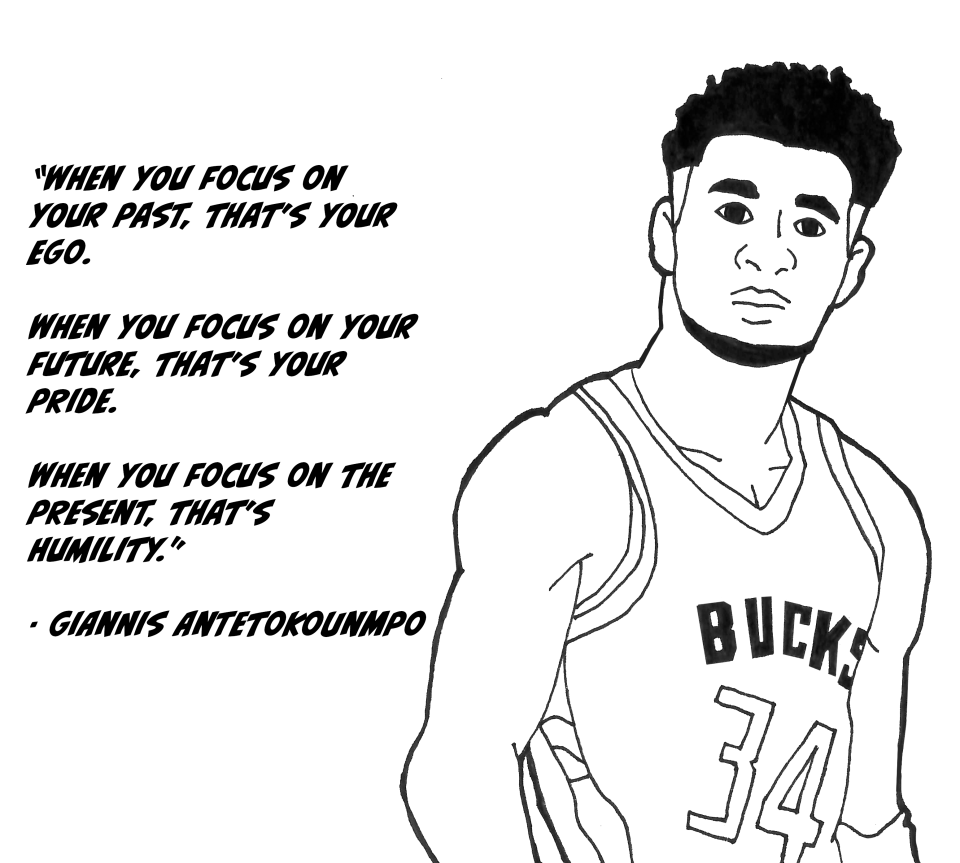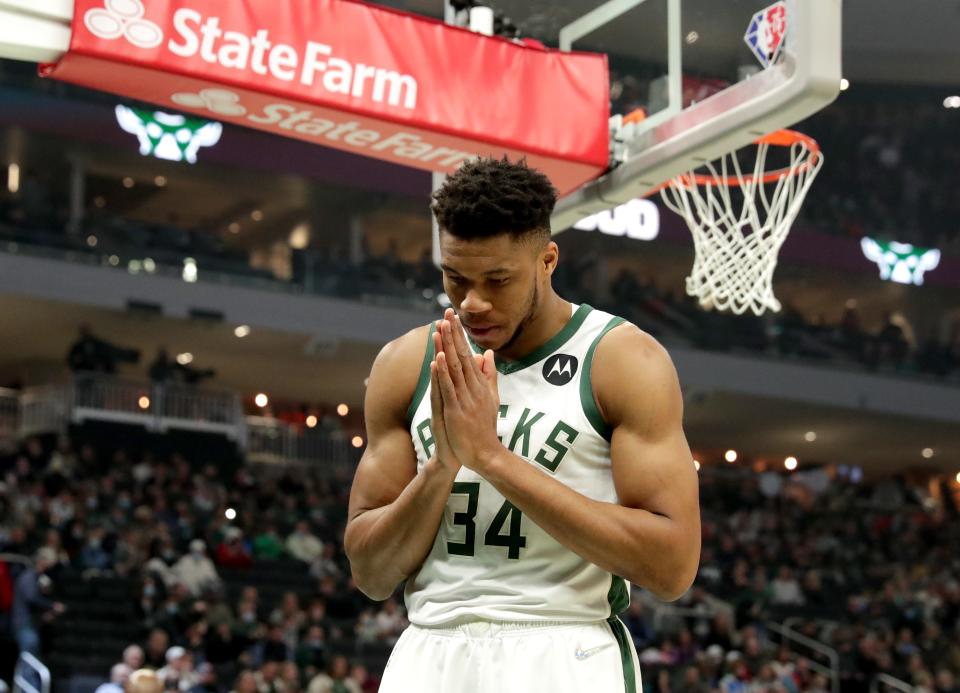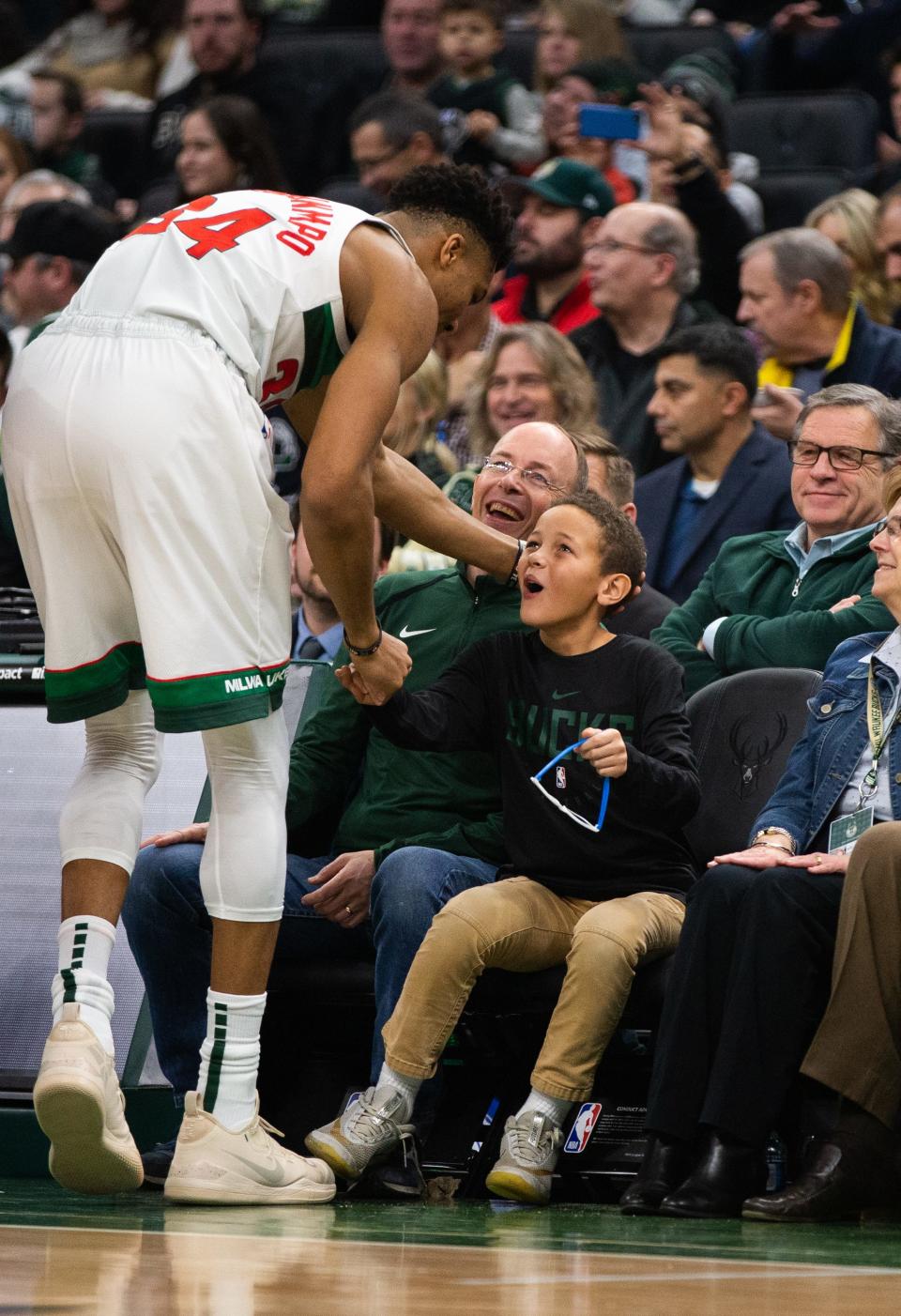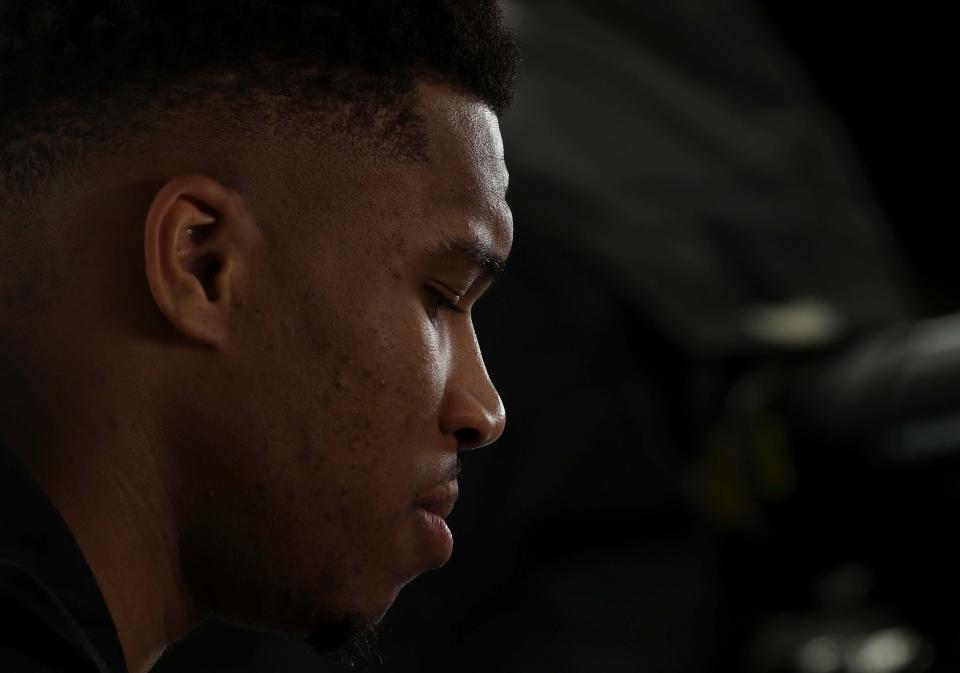'Focus on the present': How Giannis Antetokounmpo's view on ego, humility has inspired people around the world
Giannis Antetokounmpo straightened up and leaned back on a wall around the corner from the Milwaukee Bucks locker room. He inhaled deeply, allowing himself to be in the moment, to soak in the knowledge that his thoughts touched lives across the country.
A CEO in California. An infectious disease specialist in Texas. A singer-songwriter from Minnesota. An NFL tight end in North Carolina. A congregation in Milwaukee.
Antetokounmpo reached them from a news conference in Phoenix with words about handling ego, pride and his daily quest to stay humble.
He collected himself, exhaled and pitched forward a couple of steps off the wall. He had something to emphasize. That statement was a principle for him, not mere philosophy.
“That’s the only way I can stay sane,” he began, his eyes fixed deeply.
“That’s the only way. Because at the end of the day, if I’m not humble – if I’m not humble – I’m not going to be who I’m trying to be. All this, it’s…it’s…it’s…(waving his hands over his head)…How can I say it very politely…it’s madness!”
The quote nine months earlier on July 16 shone a light on how he navigates his own life, and it inspired and created a reflecting pool for countless others. And they are words he still isn’t sure should have.
The NBA Finals quote

Between Games 4 and 5 of the NBA Finals – the apex of his profession – Antetokounmpo was asked how, or where, at the age of 26 he had learned to manage his ego.
“I think I would say life,” he began.
“I figured out a mindset to have that when you focus on the past, that's your ego. I did this (he pointed his left thumb behind him). We were able to beat this team 4-0. I did this in the past. I won that in the past. …”
As he spoke, Antetokounmpo was at the axis point of his career.
Two seasons of personal and organizational playoff disappointment were the recent past. The Bucks had fallen into an 0-2 hole to the Suns and invisible hands were starting to scrawl that he could not get his team over the top, that he was a regular-season star. But at that moment, the team was two days removed from having evened the series, and the crucial fifth game followed the next sunrise. He had consecutive 40-point nights in Games 2 and 3 before posting a near triple-double in Game 4.
It's also important to remember the larger context.
On a dais in Phoenix’s Footprint Center, Antetokounmpo addressed a small group of masked reporters and league staff who were required to be vaccinated against the COVID-19 virus. It was impossible to extricate the moment from the previous 16 months of the pandemic.
“When I focus on the future, it's my pride,” Antetokounmpo continued. “Yeah, next game, Game 5, I do this and this and this (he curled up the corner of his mouth and jabbed his right index finger down). I'm going to dominate. That's your pride talking. It doesn't happen. You're right here.
“I kind of try to focus on the moment, in the present. That's humility. That's being humble (he centered his hands in front of him). That's not setting no expectation. That's going out there, enjoying the game, competing at a high level. I think I've had people throughout my life that helped me with that. But that is a skill that I've tried to, like, kind of – how do you say, perfect it.”
Antetokounmpo said what he said because it is true, a mental and emotional exercise he practices as often as his jump shot. He didn’t hold back out of fear of judgment, or even a desire to inspire. And when he ambled off the riser, he wasn’t thinking about it anymore. The moment was over, but his authenticity reverberated.
He moved people because he got out of the way.
Which is why he was in the hallway nearly a year later, why he took such a deep breath. He had no idea.
“Obviously, man this is big. This is powerful,” he said. “Saying my words inspire people to be great – that’s big. What more can you ask for?”
He then began using all his 7-foot-plus wingspan to accentuate his words, moving a step forward, back, to the side. He clapped his palms and stretched the seams of his shamrock shake-green Nike jumpsuit.
“I should definitely not be the guy to be…look for advice,” he continued. “Because I’m trying to figure out myself, too. Those things, those words I said, obviously came from my own life.”
There’s the tension for Antetokounmpo.
He’s a hero on three continents for his life journey and job as basketball Superman. He’s a purveyor of dad jokes, fine watches and apparel that bear his name. And yet he isn’t sure he’s in the right place for that place in people’s lives. Oddly, that unease is a driving reason why he is that person, why that message connected for so many around the country.
More: Nickel: Here's why Giannis Antetokounmpo should be the NBA's Most Improved Player
More: Kareem Abdul-Jabbar and Giannis Antetokounmpo's Bucks scoring marks tied together with quiet points
Staying in the the present

The Finals quote sprung to life shortly after Antetokounmpo said it, but it was a highlight of a different kind for him. It was no Eurostep, no thunderous dunk. Yet it had impact because Antetokounmpo’s search for humility isn’t passive.
The intent isn’t to dither about until the next moment is more fun, more fulfilling, more anything.
“How can you be in the moment?” he said. “Like, what happens right now. I’m talking with you. That’s it. It’s not the Finals last year. It’s not what I’ve done in the past (stretching his long right arm behind him). It’s not what I’m going to do in the future (extending his long left arm ahead). Right here (pointing his giant hands to his feet).”
It’s not easy.
Antetokounmpo has routinely said he is not attached to social media. He has instructed teammates to move away if they talk about a subject he is not in the right space to overhear. He flips over the nightly box score before taking questions.
It takes work because this kind of present is – by its nature – elusive. There’s a chase, and to truly capture it, and then maximize it, you must immerse yourself in it.
Which is why that statement at the NBA Finals was more than an illustration of personal maturity.
It was – is – a necessity.
“The only way I can stay sane and be OK with myself is by being humble,” Antetokounmpo continued, speaking steadfastly. “I’m not trying to wear a Ralph Lauren suit with a tie to go to the game with a Rolex that costs half a million dollars (he tugged at his chest and pointed to his wrist). I’m not trying to do that. I’m just trying to be me. I’m trying to be as normal as possible.”
He smiled and wistfully recalled a story from earlier in the season when he connected with a longtime friend on the road. They sought out an empty pickleball court in the quiet dark, to just play, to spend time, to catch up.
“It’s hard for people to, not to be down to earth, to see, view you as normal because sometimes you make us like way up here (holding his right hand over his head),” he said. “The media, all the attention of the Finals, I’m like, I don’t care. I just want to play good basketball. I want to take care of my family. I want to keep doing things that make me happy. And by doing that, the only way I can reach my full potential because I’ve realized this – and thank God I’m over myself – is by the more humble I can be, the more in the present I can be, the more down to earth I can be, the more hungry I can be, the more I can reach my full potential. That’s the only way.
“Live for the moment. Whatever this moment gives to me, offer me, offer me and my family … that’s enough for me. That’s the mentality. That’s how I live my life. And I try to be happy.”
He nodded with finality.
“I’m happy.”
Why it connected

In the middle of a shift at Texas Health Hospital in Plano, Texas, Dr. Anurag Duggal had to find a quiet space to talk.
He had something to say.
First, he recited the core of Antetokounmpo’s Finals quote from memory. When you focus on the past, that's your ego. When I focus on the future, it's my pride. Focus on the moment, in the present. That's humility.
“I’m telling you I’m getting killed right now with this Omicron. I’m still in the hospital. I’ve seen about 30 patients with COVID today in the hospital. It’s a lot,” the infectious disease specialist said, hospital hustle in the background. “So for me, staying in the present, doing my job and hoping for the best so we can hopefully get over this pandemic is how I reflect on this quote.”
Like so many, Duggal dropped basketball entirely from the original, full quote. The heart of it is what resonated. In conducting a dozen interviews and combing through social media posts, a pattern developed: It created self-efficacy and not just a motivation or want to.
Claire de Lune of the band tiny deaths was struck by Antetokounmpo’s mindfulness and wisdom, Carolina Panthers tight end Colin Thompson by his power and poise. Jay Aquino is a stand-up comedian in Los Angeles and it had him reflect on his generation, social media’s impact on mental health and his craft. Vincent Thompson, a communications professional in Philadelphia, routinely re-reads the quote to center himself in times of stress.
“And that steels me through,” he said.
Kristen Hernandez uses the quote for her high school students and cheer team at Sam Rayburn High School in Pasadena, Texas. The same goes for former MMA champion Ben Askren and his wrestling teams in the Milwaukee area. Terrance Cooper, a member of Evolve Church in Milwaukee, had it pop into his mind while playing a game at a family party.
Former Bucks teammate Donte DiVincenzo found himself reaching for it as his name circulated in trade rumors. Bucks guard Pat Connaughton said it helped him alleviate the excitement – and inherent anxieties – of their job.
“It’s good to have goals, but if you live your present-day life thinking about and shooting for tomorrow, how are you going to enjoy and even have success in today?” Connaughton said. “That’s what kind of hit me.”
Former Chicago Bears head coach Matt Nagy said he would hang it on the walls of his children’s bedrooms. Mental health professionals and motivational speakers across the country championed its message. So did a day trader from New York and the founder of a streetwear company in Chicago. Former Green Bay Packers vice president Andrew Brandt has it pinned to his Twitter homepage and retweets it weekly.
Christine Tsai was struck by how the quote illustrated leadership.
The CEO of 500 Global, a $2 billion venture capital firm with employees in 15 countries, Tsai said, “Especially in times like these the last couple years that have been so turbulent and uncertain, the kinds where the leaders are like, ‘yup, we’re going to crush it and win at all costs’ – I feel like – people are kind of over it. It’s just not what they want.
“They want leaders who are actually, really authentic and genuine and have that empathy. Of course still have that conviction in terms of what lies ahead and that ambition, but it’s balanced with the human part of it, which I felt like Giannis’ quote really was.”
Why did he think it connected, though?
“Life,” Antetokounmpo stated simply.
He had something more to say, to add, and he set his feet as if he was about to take off above the rim. Conversation with him is almost like a meditation, and the act of talking is a key part to his process.
“For athletes, for anybody, for any human being, being able to – it might not be sports pysch – it might be your best friend,” he began. “It might be your uncle, it might be your dad, it might be your mom, it might be somebody that you can talk to that can be neutral, listen to you.
“Be able to talk to somebody that makes it as simple as possible to organize your mind, to do two or three things a day that you need to do better. What’s the objective? I don’t know. The objective is to get better. Two to three things that you can you do better, that you need to do better. Every day. Write it down, write it down, write it down (he pantomimed a scribble). Then it comes, I don’t know, an imprint – a fingerprint – in your brain. And it becomes part of your life. All these things that I’m talking about, it’s hard. It’s complicated.”
Yet for so many, it was something so simply affirming.
Giannis: The reluctant guru

Antetokounmpo insisted he doesn’t set out to make people feel good with what he says, but he is empathetic. He’s had heroes. He studies successful people and has a natural curiosity about why they are that way. He pays attention. To some degree he has followed what other athletes have done in seeking professional guidance. He believes wholeheartedly anyone can apply this mindset.
He gets it.
But Antetokounmpo’s daily search for calm – for his sanity – informs as to why he cannot take all of this on, why he isn’t sure he should be followed.
It doesn’t come across as a defensive mechanism either, but rather an emotional regulator. It’s why he can listen to such stories, appreciate them like a fine sculpture, a three-dimensional piece that can be handled, turned around and upside down – and then put aside.
“I definitely enjoy it,” Antetokounmpo said earlier in the year. “You can never take moments for granted. But, you know, it happened an hour ago. I just leave it right there. Keep creating.
"So, obviously I appreciate the moment, but you gotta keep on moving forward, just keep on moving forward. That’s what I’ve done my whole life. That’s what I’m going to keep doing. It’s been working.”
And people are following.
Does he deserve that?
“Listen, at the end of the day, we try to be the best versions of ourselves we can be,” said Thanasis Antetokounmpo, Giannis' older brother and teammate. “And you never know how it affects somebody. And if you affect somebody positively, it’s always good, like man, I’m so happy I could bring something good into your space, into your life.
“You have to understand, it’s not easy. Sometimes you see, oh, athletes are completely different people. They’ll be like, oh, OK this person, everything is going so smoothly. But it’s not. It’s not really. You have to approach this in a way for it to go smoothly. You have to have a different way of thinking, you know?”
In the hallway in Fiserv Forum, Giannis Antetokounmpo began to slow the conversation. He gradually had shuffled to his left, closer to an exit.
He wasn’t trying to lead, to inspire, but he did. He transcended the space he tries to keep.
Could he be OK with that?
He took it in.
His lips curled up. He straightened again and literally – and symbolically – took a step back. He poured it back out.
“You know what, what people do, is out of my control.”
He smiled that globally recognized toothy smile.
“You see! You see what I’m saying! I can only control this, what’s in my hands, my legs. You see your movements? (he reached away from himself) I can’t control. When the ball leaves my hands, can’t control. What coach do, can’t control. How the guy defend me, can’t control. What people said, can’t control. It doesn’t affect me. If I can’t control it, it doesn’t affect me, you know? That’s the mindset you have to have.”
He started to walk away, and then pivoted – a philosophical Dream Shake that needed a finishing flourish. He came back and leaned forward.
He had one last thing to say.
“I’m just saying this (he put his hands up as if to ask for permission). The more joy you can have in what you do, the more you can prolong it. The more you come to your job and you’re so focused and into it (he balled his fists) and it makes you miserable because you’re thinking about it. It’s not going to help you. You might be good, but you’re gonna be sorry.
"You’ve got to be able to live in the moment. (His lower half appeared to be pulling him away to leave, but he leaned in harder.) Stay in the moment. Relax when possible. And when you come to the work area, then you focus (he slapped his hands together one final time).
“The more joy you can have in what you do, the more you can prolong your career, I believe.”
He spun away and threw a hand up over his head with a wave.
There was nothing left to be said.
THANK YOU: Subscribers' support makes this work possible. Help us share the knowledge by buying a gift subscription.
DOWNLOAD THE APP: Get the latest news, sports and more
This article originally appeared on Milwaukee Journal Sentinel: Giannis Antetokounmpo quote on ego, pride, humility has inspired many
